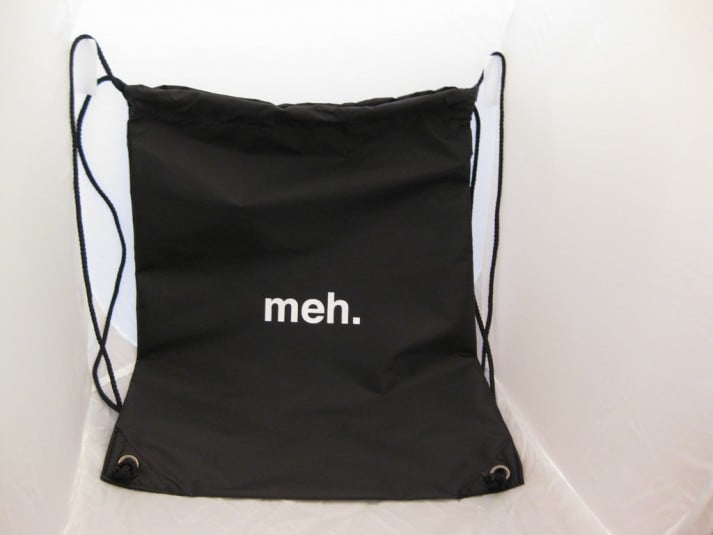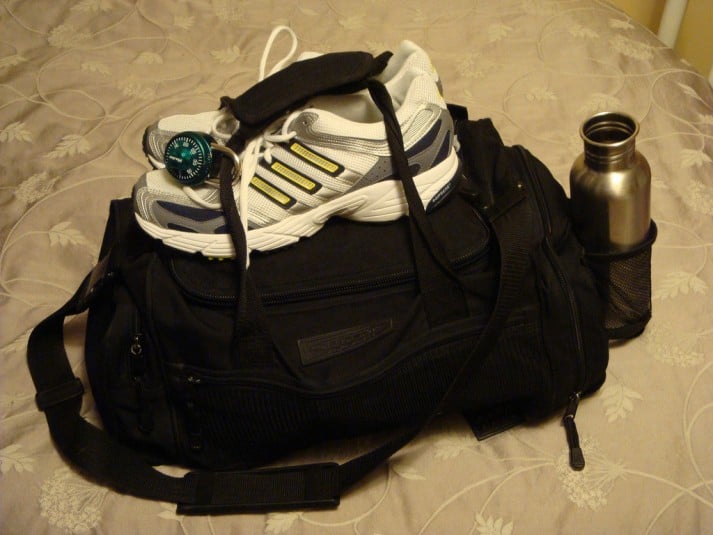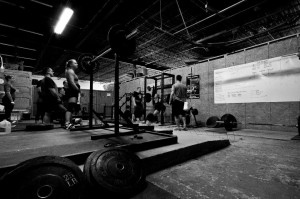“It’s dangerous to go alone, take this.” -The Old Man, The Legend of Zelda (NES).
It’s time to go to battle, infiltrating an compound full of muggles and carry out your mission that helps you level up your life and helps further the cause of the Nerd Fitness Rebellion.
You, a Nerd Fitness Rebel, are going to train in an commercial gym.
They’ll expect you to use their rigid weight machines, expensive cardio equipment, and ab torture devices machines; they’ll gleefully take you on a tour of all the AMAZING amenities you clearly need in a gym, and expect you to fall in with the masses.
You nod politely, and then go about your business of actually changing your life in an enjoyable, fun way.
You see, like Link in The Legend of Zelda, you’ve come prepared. You have a compact gym bag that comes with you every day with the right items required to level up your life.
I’m not talking about the latest and greatest pair of spandex or the best lifting gloves (in fact, I’ll tell you why you shouldn’t wear them in this article).
Instead, I’m going to walk you through what you should be bringing with you to the gym.
Note: this advice will revolve around best equipment for people looking to use free weight and bodyweight training in the gym primarily.
Rebel Recruit Bag

Before we fill up your inventory with items, we’re going to start with a disclaimer: exercising is goal #1.
This means you don’t need to do anything special other than GET YOUR ASS MOVING: you could work out in high heels, a coat of arms, and master chief helmet – that’s better than the best workout outfit that sits idle in your inventory chest back at home base. The point is this: absolutely do not let yourself avoid going to the gym today because your gear is in the mail, or you haven’t ordered it yet. That’s an excuse you need to squash: START NOW!
HOWEVER, here are a few key things that might make your workout experience better. Here’s our starter bag – The “Rebel Recruit” bag:
A simple workout bag: Regardless of what game you play, all of your inventory needs a good back to organize it! I’ve been using this boring backpack since I traveled around the world in 2011. It’s big enough to fit all the equipment below along with a hoodie or pants in case my walk to the gym is cold.
Your “gym bag” can be anything. You can even pack it every night before going to bed so you can grab it and change into your workout gear after work.
Music: This is a no-brainer, but having a workout playlist is important. A great workout playlist can give you the energy and lift you need to go from tired to PR. If you’re curious what I listen to, here’s my Spotify Workout playlist; you’ll find a bit of everything, including some head-scratching guilty pleasures. Enjoy!
Headphones. I’ve tried dozens of different types of headphones over the years, and personally prefer a cheaper pair of headphones. Although, headphones are a personal choice, so here’s a few reccomendations:
I’ve settled on these $25 headphones.
If you’re a baller like NF Team Member Staci, wireless headphones can be really helpful too depending on your level of activity.
NF Team Member Taylor prefers these slightly cheaper wireless headphones.
A way to track your workouts: Every workout I have done is tracked in a simple text-format in the free Evernote app. I simply note what exercise I’m doing and how many reps per set and how much weight I lifted (here’s a screen shot of my workouts). I can quickly go back and review previous workouts and see what I lifted last time in order to be better next week. Staci prefers (like many) to track her workouts in an actual notebook (like this one), so something like a spiral bound notebook also works great. Just make sure you are writing down what you do so you know what you need to do next time!
Comfy workout clothes: They don’t need to come from Lululemon, they don’t need to be expensive, and they don’t need to be moisture-wicking. Wear comfortable clothes that don’t restrict your movement. Baggy shorts and old nerdy t-shirts? Great.
What shoes should you train in? If you’re just starting out, feel free to train in the shoes that you currently own. I don’t care what they are, but don’t let this be the limiting factor keeping you from exercising!
Personally, I’m a big fan of my Merrell Vapor Glove 2 Trail Running Shoes (which I’ve switched after Vibrams – same benefit, 1/10th of the questions from strangers!). They work great for the gym and for my workouts. But again, just train in whatever you currently own!
If you own Chuck Taylors, those are GREAT for lifting (they have a strong sole and no cushiony heel – which we’re trying to avoid). If you’re going to deadlift and squat, do them barefoot if you happen to train in thick-heeled shoes.
Water Bottle (optional): my gym has water fountains throughout the gym, and I like to take the walk to and from one between sets as kind of my mental reset. However, you might want to bring a water bottle with you. We recommend something this stainless steel bottle that holds up to repeated use.
DO NOT BUY OR BRING: Gloves. Many people think that in order to protect your hands or help with grip, you should wear gloves. In fact, gloves make the bar harder to hold and can make your grip worse! Instead, you should allow your hands to build up calluses slowly and just take care of them (here’s a great video from Donny Shankle on hand care). If you have a callus and you wear gloves over it, the extra piece of cloth rubbing against it will often make it rip. Picking up things without gloves is a great way to develop grip strength!
Veteran Rebel Bag

Now that you’ve been going to the gym and training for a few months, you’ve realized you’re actually enjoying lifting heavy stuff!
It’s time to start taking your hobby a bit more seriously, and there are a few key pieces of equipment that can improve your experience.
A jump rope for warming up: Jumping rope is a fantastic skill to develop and a great way to warm up before getting started in the gym. We recommend a speed rope like the following, that will eventually allow you to do the infamous “double under” (jumping once and having the rope go under you twice, made famous by Crossfit).
Chalk Bag: Grip strength is a crucial part of building a strong and balanced body. Whether I’m doing deadlifts or pull-ups, I want to make sure my grip works great. Now, most gyms don’t want tons of chalk everywhere, so I’ve found this small bag really helps keep the mess down and my grip up! If your gym doesn’t allow chalk, you can get liquid chalk.
Dip belt: At some point, you might get to a level where just doing more and more reps of pull-ups or dips starts to lose their effectiveness. This is where a dip belt can come in. I wear one and hang weights from it for weighted pull-ups and weighted dips. Like anything, I started on this years ago at a very low weight (just hanging 5 pounds from it), and have slowly built up my strength safely over many years since then.
Veteran Shoe Recommendations: Our advice is to train in shoes that have zero or little drop (meaning the heel and front of your foot are at the same height when you wear them). I would recommend against training and lifting in running shoes with a high heel drop and lots of padding. While they say they offer “support” the cushion makes it more difficult to properly drive through your heels and keep the correct balance in your foot. Again, chucks are a great option. And if you are ready to get a real lifting shoe, see the next section.
Tall socks on deadlift days (optional): Both Staci and I recommend wearing tall socks, goofy like these on deadlift days. They’re really helpful for keeping you from scraping the shit out of your shins on heavy deadlifts! Also, admittedly they make me feel like a bit more of a badass, which is crucial for the GAINZ.
Lifting belt (optional): Belts can be a great tool to help you get stronger, though not necessary, especially if you’re just starting out. Be sure to check back for an article on this soon on Nerd Fitness. I train without a belt, while our resident badass Staci uses a single prong leather lifting belt from Best Belts: a 4″ for squats and deadlifts and a smaller 3″ belt for bench press.
iPod Tripod (optional): This is one of the best $20 expenditures you can make if you’re looking to improve yourself. The point of the tripod is to record yourself doing a movement so you can analyze and critique (or have somebody else do so!) your form and make sure you are doing movements correctly. I record my max attempts on deadlifts, new gymnastic holds, squats (to make sure I’m going deep enough), and so on. Yup, you may get strange looks as you record yourself at the gym (though at many gyms, nerding out about your form is totally normal and even a sign of a seasoned lifter).
Lifting straps (optional): Now, you do NOT need Straps, and we do NOT recommend you use them to allow yourself to reach a higher max on a deadlift. You’re better off building up your grip strength (thank you, Chalk!) and letting your body develop that balance. However, if your program has accessory lifts or high rep rows/romanian deadlifts, after your grip is shot from too many heavy deadlifts, you can consider using them. Be sure you know how to use them correctly, not as a crutch for grip strenght. I prefer leather straps like these.
Rebel Elite Bag
Okay, now we’re getting into truly elite/gymrat territory.
This is where your friends at the gym start to ask if your gym bag is like Hermoine’s bag in Harry Potter. Or, if you’re Staci and a powerlifter, they might ask if you’ve seen the BroScience video on what to bring to the gym.
All of the following equipment is optional, and heavily dependent on your goals. My goals are primarily gymnastic focused, while Staci’s get more into advanced raw powerlifting territory with her recommendations:
Gymnastic Rings (Steve): For the past few years, I’ve been using a pair of wooden rings from FringeSport. I’m a BIG fan of wooden rings, and also a firm believer that everybody should mix some ring work into their workouts for a few reasons.
They are great at building up stability and strength and they’re a lot of fun, and super flexible. I bring my rings with me every day to the gym and hang them from the highest point I can find. It could be a TRX suspension system, a Smith Machine, even the underside of a staircase. When I travel, I’ve hung my rings from swing sets, tree branches, even yachts.
If you’re interested in mixing gymnastic work into your routine, our Nerd Fitness Academy is about to receive a mega-update with some great options!
Fractional plates (Steve): Sometimes, moving up by 5-10 pounds on a lift is too much for a body and brain to handle. I know how mentally exhausting and demoralizing failing a lift can be, so I’ve started using “fractional plates” (1/2 lb each). These allow me to increase the weight I’m lifting each week by just a single pound (1/2 lb. on either side of the bar). Mentally, my brain says “that’s just one pound more than last week!” But every week I get a tiny bit stronger with every workout.
Mini-Paralettes (Steve): These are a new purchase, but in my quest to get stronger with fun gymnastic holds, they are portable enough to fit in my backpack and allow me to build up my static strength (when you hold a pose without moving – example without parallettes). Up until buying these parallettes, I used hexagonal dumbbells as my parallettes.
Lifting Shoes (Staci’s advice) If you are a Weightlifter (the sport of snatch and clean & jerk), check out a shoe specifically made for weightlifting like Nike Romaleos. These have an elevated heel and are also great for squats.
For a great flat lifting shoe, check out Reebok CrossFit Lite Low TR shoes – these are similar to the Converse All Star, my previous choice for lifting in flat shoes, though their toe box is wider and the sole is a bit grippier.
For information on whether a higher heel is better or worse for squats, it depends on your goals!
If your gym doesn’t allow you to deadlift barefoot or you don’t have very thin soled shoes, consider Deadlift slippers.
Knee Sleeves (Staci) – These are neoprene and the purpose is to keep your knees warm and offer a bit of support and compression (unlike knee wraps that help you lift heavier weight, or knee braces that help with stability). Rehbands are also super high quality but less stiff than the SBD’s.
Slingshot Hip Circle (Staci) or exercise bands – Great tool to warm up the hips and glues, but also I use it for banded squats and hip thrusts. You could use a band instead, but I like the consistency of having my own circle.
Wrist wraps (Staci) – these offer a bit of support on your wrists once you start squatting or benching heavier weights, and are only in the bag of a serious powerlifter with a niche need.
What in Your Bag?
Using workout gear as a reward for building healthy workout habits and sticking to your diet can be an excellent way to reward yourself with things that reward you back. Far better than fast food after a workout or a new video game – get yourself a reward that encourages you to keep leveling up.
Whether or not you use your gear as a way to level up, there’s nothing wrong with gearing up so you to the gym with confidence and excitement – just don’t let it be the limiting factor. You don’t need the perfect clothes or gear to work out.
What’s in your bag that we missed?
-Steve
###
photo: Dean Jarvey: Gym Bag, bnilsen: meh bag
from Blog – Nerd Fitness http://www.nerdfitness.com/blog/2016/04/14/what-essential-items-do-you-need-to-bring-to-the-gym/
via IFTTT

No comments:
Post a Comment